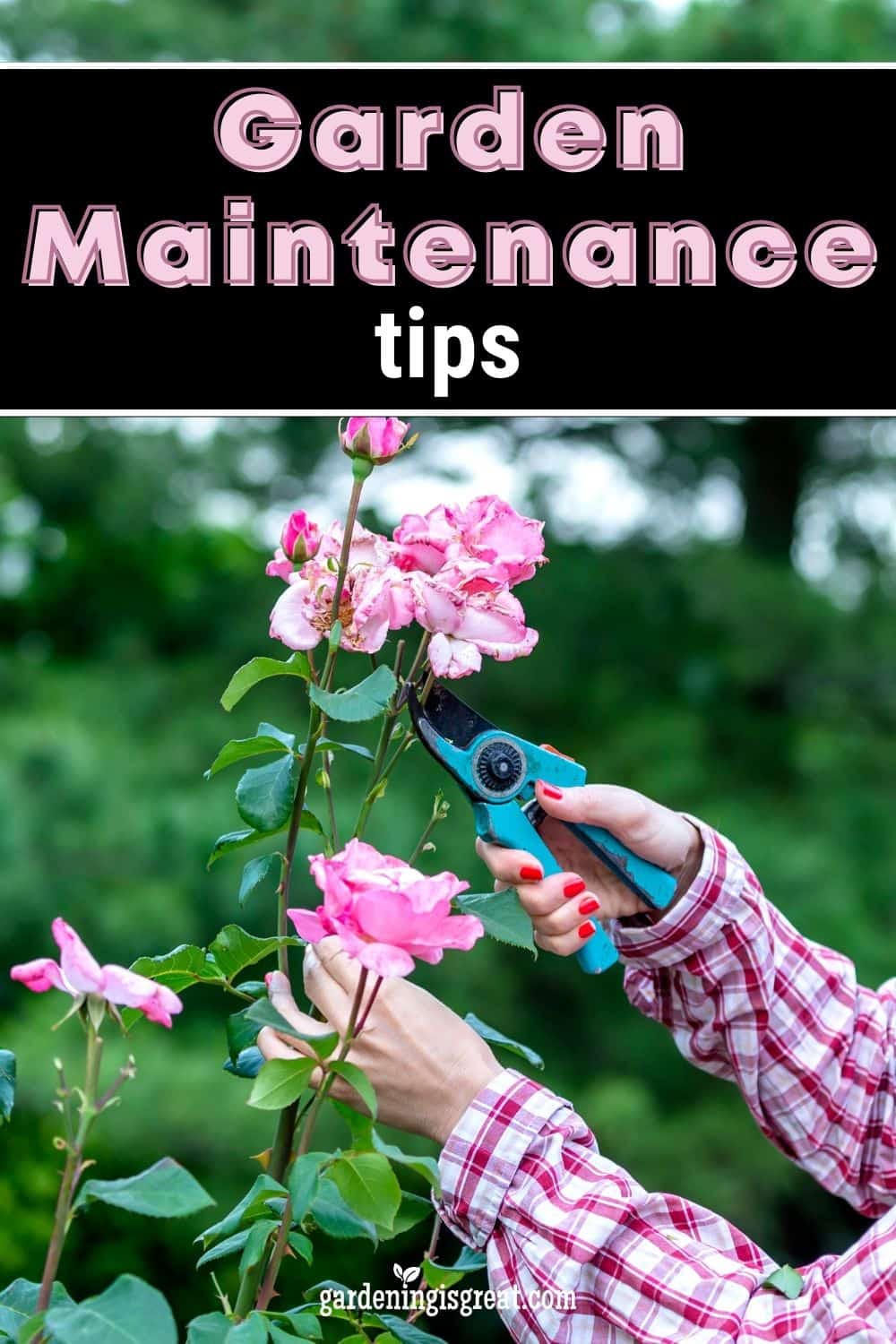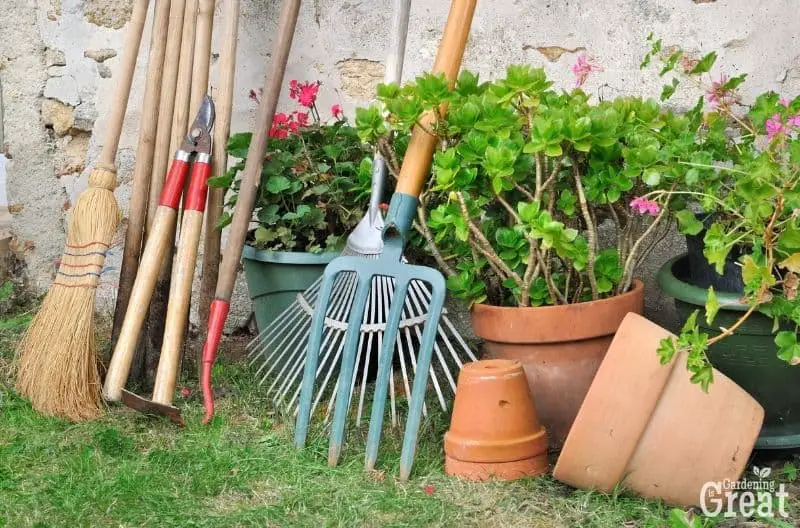5 Essential Garden Maintenance Tips to Maintain a Beautiful Garden
Carrying out the garden maintenance tips within this post is a sure way to help you manage and maintain your garden whilst also minimizing pests and helping your plants to flourish.
Are you wondering how to maintain your garden and maximize its potential? Garden maintenance doesn’t have to be difficult or particularly time-consuming.

This post contains affiliate links that earn me a commission at no additional cost to you.
The first time you actively maintain your garden may take longer than usual. This is because if you haven’t been maintaining your garden, it may be overrun with weeds and pests and completely overgrown.
But, with consistent efforts, you’ll have your garden looking just the way you want in no time, and garden maintenance will be a lot faster the next time around.
Why Maintain Your Garden?
Still not convinced if garden maintenance is really all that important? Read on to understand the benefits of dedicating time to your garden each week.
Plant Health
Garden maintenance isn’t just about beautifying your garden. It’s incredibly important for your plant’s health. A messy garden overrun with weeds ends up choking your plants. They compete for the nutrients within the soil and sunlight.
When a garden is overrun with weeds, it makes it difficult for your plants to grow to their full potential.
Clean Air
As you may know, plants breathe in carbon dioxide and release oxygen. They help clean the air around us improving the air quality that we breathe.
We rely on plants in order to survive. By maintaining your plants and helping them to thrive, you are supporting them with the ability to clean the air around them.
This is particularly important in areas of high air pollution such as inner cities.
Health Benefits
Spending time being active outdoors offers several benefits to your health. Physically, you are moving your body and increasing your physical fitness through digging, mowing, bending, and lifting.
Spending time outdoors in the garden, you are also exposing yourself to vitamin D. Vitamin D is a vital vitamin for increasing calcium and improving your bone health and immune system.
Finally, emotionally and mentally, spending time outdoors can help to lift and improve your mood. Gardening has been found to decrease stress and symptoms of depression, increasing the release of serotonin and dopamine aka ‘happy hormones’.
Encourages Pests
An overrun garden with lots of weeds, an overgrown lawn, and dead flowers and leaves encourages pests. Rotting plants give off smells that entice pests such as rats into your garden. Plus, a long lawn encourages pests to build a nest.
So now we know the benefits and why you should maintain your garden, let’s take a look at these top tips:

5 Garden Maintenance Tips
These 5 essential garden maintenance tips will help you maintain your garden and ensure it doesn’t become overgrown or full of pests.
Water your garden
Watering your garden may seem like a common-sense garden maintenance tip, but it is one of the easiest to forget.
Most of the plants in your garden will not have deep roots and hence cannot access water deep underground. They rely on rainwater and water from you, especially pot plants.
It’s good to get into a routine of watering your plants on a daily basis. Try to avoid midday when the sun is highest and can dry the water before it reaches your plant’s roots.
Also, ensure to avoid watering the leaves and flowers and focus on the roots of your plants. By watering leaves, you are encouraging mold and fungus to grow which attracts pests and can lead to disease.
Try to get into a routine of watering your plants either first thing in the morning or last thing at night when the day is coolest. During the summer, when it’s hot and dry, ensure to water your plants twice a day.
Use a Fertilizer
As plants gain their nutrients from the soil, it is really important that the soil is of high quality. However, most soil consists of either too much clay or too much sand.
You can purchase ready-made fertilizers which have the necessary nutrients of phosphorous, nitrogen, and potassium.
However, many shop-bought fertilizers contain other harmful chemicals. To avoid these, you can easily make your own natural fertilizer from compost.
For example, eggshells are an excellent source of calcium and other minerals. This is at no additional cost than your usual weekly shop.
Your discarded eggshells can be crushed and powered to place in or on the soil around your plants. Eggshells naturally decompose, and when they do, release their nutrients into the soil.
Weeding
There are a number of ways in which you can weed your garden. One of the best methods is by using either your hand or a small tool such as a hand fork. Dig down to the end of the weed’s roots and pull them out.
It is important to ensure you have pulled all of the weed’s roots as if any part has been left, the plant can regrow again.
Alternatively, you can use a weedkiller to spray onto your weeds if you would rather have a hands-off approach. Just ensure you do not accidentally spray your plants, as it will kill those too.
Also, double-check your weedkiller if you have pets, as many weedkillers can be harmful to animals, particularly cats and dogs.
Deadheading
Deadheading your flowers is really important for the overall health of a plant and supporting it to reflower for longer.
Deadheading involves the removal of dead or dying flowers. When a flower has reached this stage, the plant is focused on the development of seeds. By removing these old flowers, you are helping the plant to refocus on producing new flowers and hence prolong its flowering season.
To deadhead a flower, simply pinch below the fading flower and pull it off the stem. You can alternatively use clippers and cut the stem just below the flower head.
Pest Control
Pests can be a nuisance, but if you don’t deal with them, the problem just grows. First, ensure that you have removed anything that can be attracting pests into your garden, such as:
- Stagnant water
- Sources of food
- Piles of grass cuttings or logs of wood
- Disposed of garbage in a closed bin
Next, identify the pests that are in your garden so you know how best to deal with them effectively. Here are a few common garden pests and what to do if you have them:
Aphids: These horrible green flies get everywhere once they start to invade your garden. The good news is that they are a favorite meal for ladybirds. By planting a range of nectar-rich flowers, you naturally encourage ladybirds to visit your garden. In return, they will feast on aphids and help your garden to thrive.
Vine Weevils: These black beetles not only munch through your leaves but lay their larvae in your soil which feed on the roots, killing your plants. A great solution is to use nematodes. These are microscopic worms that are added to your soil and kill off the black beetle’s larvae, helping to protect your plant’s roots.
Slugs and Snails: Slugs and snails are a vegetable gardener’s worst enemy. They devour leaves at surprisingly quick speeds. To help remove these invaders from your garden, create barriers between them and your plants, such as placing eggshells or coffee grounds on the soil around your plants. You can also encourage their natural predators into your gardens, such as hedgehogs and birds.
By following these 5 top tips, you will have the garden you desire in no time. After the first time you maintain your garden, it will become easier and quicker to manage.
A maintained garden is beneficial not only to your plants, but also to your own health. Use these 5 tips to help you get started and enjoy your garden’s maximum potential.
For more gardening guides, take a look at the following posts:
